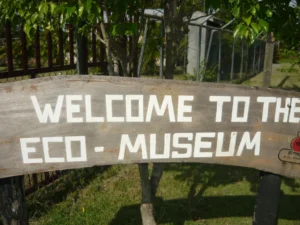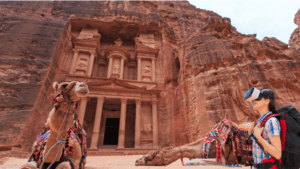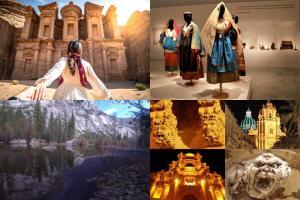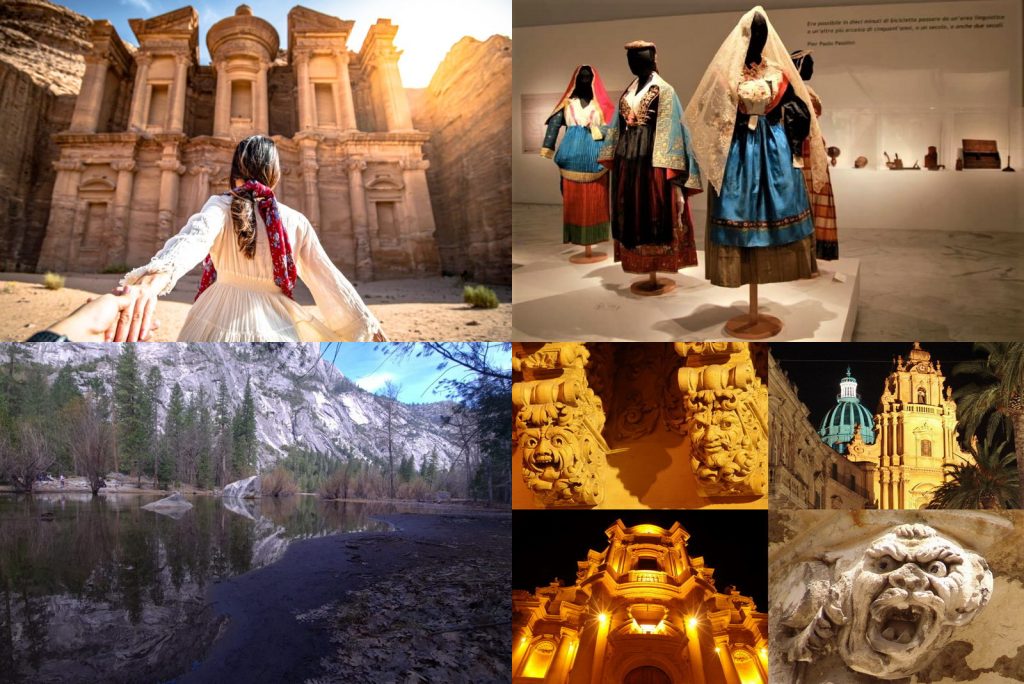Environmental Educator (SP/TAH-CF/PPC18)
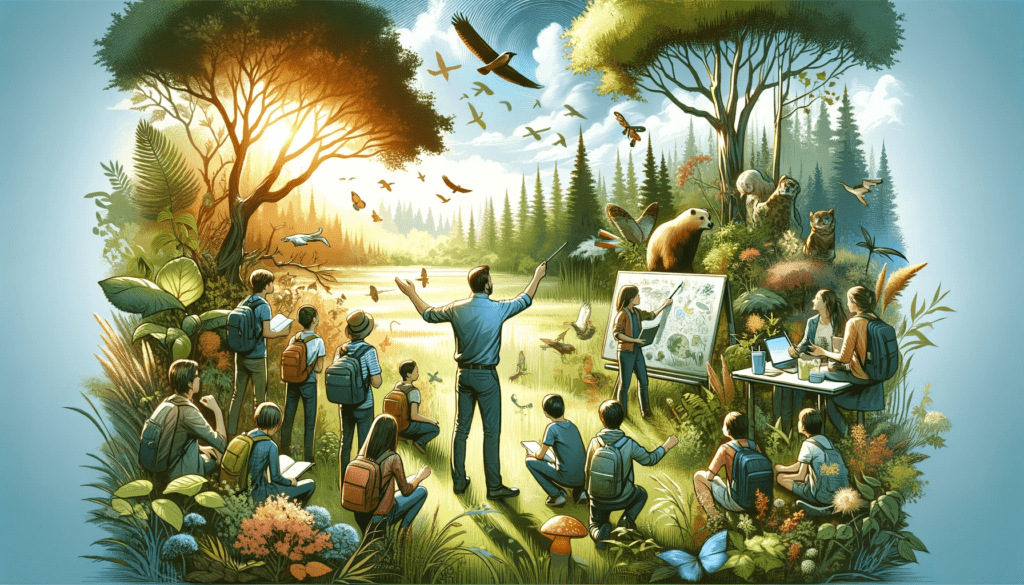
TAECF Scheme: SP/TAH-CF/PPC18 (Version 1.2)
Reference scheme developed in accordance with the standard: SP/TAH-CF: Professional Standard (SP) 3.0 based on the professional skills indicated in the Framework of Competences of Tourism, Arts and Cultural Heritage. The scheme is created in accordance with the European Qualification Framework (EQF), Recommendations 2009/C 155/02 (European Credit System for Vocational Education and Training - ECVET) and the model called "Skills Cycle".
The scheme is subjected to an initial public survey available to all stakeholders in the cultural tourism supply chain in order to collect comments and contributions useful for improving its contents. All interested parties are invited to improve the scheme by sending their contributions to info@aiptoc.it
1. Title and Description
PPC18: Environmental Educator (Environmental Trainer)
The Environmental Educator is a highly specialized professional figure who focuses on raising awareness and education regarding environmental issues and sustainable development. His skills encompass various aspects, from in-depth knowledge of ecosystems and biodiversity, to the ability to promote sustainable practices, up to the research and valorization of environmental assets.
The Environmental Educator's areas of expertise include:
-
Identification and Knowledge: Ability to identify key elements of ecosystems, understand interactions between species and the impact of human activities on the environment.
-
Protection and Research: Commitment to protecting the environment through scientific research and the application of conservation methods and techniques.
-
Enhancement: Promotion of natural heritage as a precious resource that needs conservation and attention.
-
Training and Education: Development and implementation of educational programs aimed at different age groups, with the aim of increasing environmental awareness and promoting sustainable behaviors.
-
Promotion of Sustainable Development: Encouraging practices that balance economic, social and environmental needs for present and future generations.
The Environmental Educator can be an employee or a self-employed worker who provides his services in a variety of contexts, from environmental education centers to parks and nature reserves, from educational institutions to non-profit organizations and local authorities.
Its activity can vary from theoretical lessons to practical workshops, from guided excursions to awareness campaigns, always with the aim of increasing awareness and respect for the environment.
The figure of the Environmental Educator is fundamental in an era in which environmental issues are increasingly pressing. Through their work, environmental educators not only impart important knowledge, but also inspire positive change in individual and collective behavior towards a more sustainable future.
2. Standards of Reference
- European Qualification Framework (EQF)
- Recommendation 2009 / C 155/02 (European Credit System for Vocational Education and Training - ECVET)
- Law 4/2013 relating to non-regulated professions
3. Terms and Definitions
4. Specific tasks and activities
When assigning tasks, the following distinction was made:
- Fundamental tasks: indispensable tasks for the professional figure
- Optional tasks: tasks additional to the fundamentals which are at the discretion of the individual professional or which depend on particular ecomuseum contexts
Description of the basic and specific tasks
The individual tasks can possibly be described by a set of specific activities associated with them.
The specific tasks and activities are listed below, associating, for each specific task or activity, the requirements of knowledge, skills and competences. Finally, a summary correlation matrix will be indicated in order to provide a synthetic and overall representation of the above.
- T1: Carry out study activities in the field of environmental education and in similar and related disciplines
- T2: Analyze the Reference Context
- 1 Identify and analyze the stakeholders (who are the interested parties)
- 2 Identify and analyze the sector legislation
- 3 Identify and analyze the relevant Environmental Heritage
- 4: Evaluate the training needs and expectations of real and potential users for the reference sector
- T3: Identify purpose, objectives and typology of the educational service (characteristics of the service)
- T4: Designing the educational service
- T5: Communicate the educational service
- T6: Realize the educational service
- 1: Plan the activities and procedures of the educational service
- 2: Manage economic resources (budget)
- 3: Manage human resources (staff)
- 4: Guarantee the correct carrying out of the educational service
- 5: Verify and monitor compliance with the applicable legislation in force
- 6: Monitor and evaluate the educational services provided
- T7: Improving the educational offer (continuous improvement)
Optional tasks
- T8: Create and curate exhibition events on environmental themes
- T9: Develop and implement environmental excursions for educational and ecotourism purposes
- T10: Interfacing in a foreign language according to the territorial target of reference of its customers
The skills of tasks T8, T9 and T10 can also be made available by other members of the team responsible for carrying out the environmental education service where the user's request requires it.
5. Skills, Knowledge and Autonomy and Responsibility
T1: Carry out study and research activities in the field of environmental education and in similar and related disciplines
Ability
- SP47: Knowing how to use study tools and methodologies
- SP88: Knowing how to prepare studies, reports and scientific surveys related to one's reference sector
- SP89: Knowing how to develop and promote research projects related to one's reference sector
- SP92: Apply Documentary Research techniques and methodologies
- SP43: Identify and evaluate the applicability of legislation on copyright and copyright
- ST22: Knowing how to apply tools, including IT tools, for drafting educational reports and documents
Additional required knowledge:
- KT5: Basic IT and telematic tools
- KT6: IT tools for communication
- KT25: Legislation on Author's Rights and Copyright
- KS128: Documentary Research Methodologies
- KS129: Research and teaching methodologies relating to one's reference sector
- KS130: Research planning methodologies in relation to one's reference sector
T2: Analyze the Reference Context
T2.1 Identify and Analyze the stakeholders (who are the interested parties)
Ability
- SQ1: Analysis skills
- SP24: Identify the Strategic Stakeholders
Additional required knowledge:
- KS125: Organizations and Institutions operating in the Environmental and Sustainability fields
- KS24: Destination Management Organization (DMO)
- KTN12: The environmental protection and surveillance bodies
T2.2 Identify and Analyze sector legislation
Ability
- SQ1: Analysis skills
- SP1: Identify and evaluate the applicability of the rules for the protection and use of the Cultural and Landscape Heritage
- SP2: Identify and evaluate the applicability of the legislation on safety in the workplace with relevance to its reference sector
- SP4: Identify and evaluate the applicability of the Tourism Legislation
- SP87: Identify and evaluate the applicability of the Environmental Protection and Sustainable Development Legislation
Additional required knowledge:
- KS39: The legislation for the protection and use of Cultural Heritage
- KS40: The criteria for the protection of cultural heritage
- KS41: The various levels of protection
- KS43: Landscape assets
- KS47: The legislation on privacy and the tourism sector
- KS48: The European Regulation 2016/679
- KS49: The legislation on safety in the workplace in the tourism sector
- KS106: Tourism Legislation
- KS126: Principles of Sustainable Development
T2.3 Identify and analyze the relevant Environmental Heritage
Ability
- SQ1: Analysis skills
- SP30: Analyze and relate the Naturalistic Heritage
- SP72: Know and analyze the anthropic context of one's own territory
- SP74: Know and analyze the endogenous cultural attractions of one's own territory
- SP94: Knowing how to analyze the territorial context from a cultural and historical anthropological point of view
Note: Endogenous attractions: natural/environmental attractions (mountains, lakes, beaches, rivers, climate, etc.) or cultural attractions (cooking, crafts, language, customs, monuments, historical facts, etc.)
Additional required knowledge:
- KS6: Nature Tourism
- KS4: Sustainable Tourism
- KS7: Cultural Tourism
- KTN: The Naturalistic Heritage
- KTN1: Protected Natural Areas
- KTN2: Parks and Nature Reserves
- KTN3: Nature reserves
- KTN4: Natura 2000 network
- KTN5: Sites of Community Interest (SIC)
- KTN6: Special Protection Areas (SPAs)
- KTN7: Special Areas of Conservation (SAC)
- KTN8: The Wetlands
- KTN9: The Geosites
- KTN10: Management tools for protected natural areas
- KTN11: Landscape Plans
- KTN13: Strategies for Biodiversity
- KS223: Territorial context from a cultural and historical anthropological point of view
T2.4: Evaluate the training needs and expectations of real and potential users for the reference sector
Expertise
- CTS7: Use Territorial Marketing tools
- CTS9: Perform Needs Analysis
- CTQ1-1 Identify and analyze the environmental training/educational needs of users/beneficiaries
Ability
- SQ1: Analysis skills
- SQ2: Ability to synthesize
- SQ10: Analyze the training/educational requirements of users/beneficiaries on environmental matters
- ST23: Use Territorial Marketing tools
Additional required knowledge:
- KQ2: Quality Management - Factors, indicators and standards of quality in services
- KQ22: Quality Management - Factors (dimensions) and quality indicators
- KS6: Nature Tourism
- KS4: Sustainable Tourism
- KS29: Territorial Marketing
- KQ33: Quality Management - Stakeholder Requirements Analysis
- KT26: Methods and tools for analyzing training/educational needs
T3: Identify purpose, objectives and typology of the educational service (characteristics of the service)
E.g. environmental education programs, seminars, environmental education and communication campaigns, education campaign for sustainable development, naturalistic itineraries for educational and ecotourism purposes, activities defined in the context of programs such as Agenda 2030 or Agenda 21, etc.
Ability
- SP93: Classify and evaluate the various types of educational paths
- SP22: Evaluate the applicability of European, national and regional policies on the environment and sustainable development
Additional required knowledge:
- KS85: European, national and regional policies on the environment and sustainable development
- KS222: Characteristics of environmental education services
- KS221: Environmental educational paths (classification and basic concepts)
- KS192: Physical geography (knowledge and basic concepts)
- KS193: Anthropic geography (knowledge and basic concepts)
T4: Designing the educational service
Ability
- SQ1: Analysis skills
- SQ11 Design processes and services
- SQ12: Implement, document and classify core processes
- SQ14: Propose process changes to facilitate and rationalize improvements
- SQ18: Identify, understand and evaluate quality factors, indicators and standards
- SP76: Analyze the Physical Geographical Context of the Territory
- SP85: Analyze the Botanical, Zoological and Anthropic Context of the Territory
- SP3: Evaluate the applicability of funding for the sector supply chain
- ST23: Use risk management tools
Additional required knowledge:
- KQ1: Quality Management - The UNI EN ISO 9001 standard
- KQ22: Quality Management - Factors (dimensions) and quality indicators
- KQ11: Quality Management - Design and development;
- KT18: Design and Planning of Educational/Training Paths
- KS191: Physical geography (knowledge and basic concepts)
- KS198: Support services to the basic offer
- KS99 Risk Management
- KS206: Competent services and authorities in the event of accidents or sudden illnesses
- KS208: Notions of Botany, Zoology and Anthropic Geography of the reference territory
- KT5: Basic IT and telematic tools
- KT16: Corporate Organizational Models
- KS85: European, national and regional policies on the environment and sustainable development
- KS50: Sector loans
- KS224: Principles of nutrition education
- KS225: Elements of natural sciences applied to the exercise dedicated to the exercise of environmental education activities
- KS226:Elements of history applied to the exercise dedicated to the exercise of environmental education activities
- KS227: Elements of anthropology applied to the exercise dedicated to the exercise of environmental education activities
- KS228: Agenda 21
- KS229: Agenda 2030
- KS255: Methodologies and techniques of Education for sustainable development
T5: Communicate the educational service
Ability
- SP8: Develop a Communication Plan for the reference sector
- SP11: Identify the web technologies to be used for territorial marketing
- ST1: Ability to communicate
- ST6: Identify and apply IT tools for communication
Additional required knowledge:
- KQ34: Quality Management - Internal and external communication
- KS30: Tourism and Communication
- KS31: The Communication Plan
- KS32: Online Marketing and Promotion
- KS33: Web Marketing Techniques
- KS34: Social Marketing
- KS100: Information technology for communication
T6: Realize the educational service
T6.1: Planning educational service activities and procedures
Ability
- SQ5: Ability to plan the educational service on the basis of the type of target group of the service and the pre-established time
- SQ3: Organizational skills
- SQ13: Implementing Procedures and Operating Instructions for Quality
- ST5: Identify and apply the basic IT and telematic tools
Additional required knowledge:
- KQ7: Quality Management - Planning and monitoring of the service
- KQ8: Quality Management - The procurement system
- KQ4: Quality Management - System Documentation; the Manual; Procedures and Operating Instructions;
- KS101: Basic IT and Telematics
- KS127: Methodologies and techniques for the evaluation of training events
T6.2: Managing economic resources (budget)
Ability
- ST9: Use corporate accounting and administration tools
Additional required knowledge:
- KQ8: Quality Management - The procurement system
- KS103: Business Administration
- KT9: Business administration and accounting tools
T6.3: Manage human resources (staff)
Ability
- SQ9: Identify skills gaps for quality
- SP18: Identify skills and competences gaps for the reference sector
- ST2: Group management skills
- ST3: Conflict management skills
Additional required knowledge:
- KQ5: Quality Management - The management of human resources
- KS104: Communication and Conflict Management
- KS105: Communication styles and effective communication
- KT13: Contracts
T6.4: Ensure the correct performance of the educational service
Ability
- SQ4: Ability to control
- SP77: Know how to use organizational techniques and methodologies for environmental education services
- SP86: Ability to relate and inform in relation to the context of the education service
- ST21: Ability to respect deadlines and programmes
- SP36: Carry out training/education with reference to subjects related to one's profession
- SP45: Develop educational projects in the relevant sector
- SP46: Taking care of and managing educational services in the reference sector
- ST1: Ability to communicate also in relation to the different characteristics, typologies and expectations of the users/beneficiaries
- ST3: Conflict management skills
- SP87: Ability to organize rescue with the competent and available services in the area
Additional required knowledge:
- KQ6: Quality Management – Logistic resources: equipment and working environment
- KQ9: Quality Management - Production and provision of the service;
- KQ10: Quality Management - Identification and traceability;
- KS208: Notions of Botany, Zoology and Anthropic Geography of the reference territory
- KS210: Elements of Ethology (Behavioral Biology)
- KS211: Elements of Naturalistic Disclosure
- KS212: Elements of Environmental Interpretation
- KS213: Environmental Education and Sustainability
- KS214: Elements of Ecology and Biodiversity
- KT19: Realization and Management of Training/Educational Paths
- KS230: Methods and techniques for creating and organizing educational and ecotourism itineraries
- KS112: Teaching techniques and methodologies
- KS231: Animation techniques
- KTN13: Strategies for Biodiversity
- KT1: Communication
- KT2: Group management techniques
- KT3: Conflict Management Techniques
- KT24: Elements of Leadership and Group Psychology
- KS99 Risk Management
- KS206: Competent services and authorities in the event of accidents or sudden illnesses
- KS128: Elements of Pedagogy
T6.5: Verify and check compliance with applicable legislation in force
Ability
- SQ4: Ability to control
- SP2: Check the correct application of the safety regulations in the workplace
- SP4: Verify the correct application of the Tourism Legislation
- SP42: Verify the correct application of the legislation on privacy
- SP87: Identify and evaluate the applicability of the Environmental Protection and Sustainable Development Legislation
Additional required knowledge:
- KS47: The legislation on privacy and the tourism sector
- KS49: The legislation on safety in the workplace
- KS52: Consumer protection legislation
- KS106: Tourism Legislation
- KS232 Environmental Protection and Sustainable Development Regulations
- KTN12: The environmental protection and supervisory bodies
- KT20: Waste disposal regulation
- KT27: Hygiene and Food Safety
- KT28: Risk analysis and prevention based on the reference context
T6.6: Monitor and evaluate the educational services provided
Ability
- SQ20: Apply monitoring methodologies and techniques
- SQ21: Apply Customer Satisfaction methodologies and techniques
- SQ22: Monitor and Evaluate the provision of services
Additional required knowledge:
- KQ13: Quality Management - Monitoring and measurement of processes and services
- KQ14: Quality Management - The Management of Non-Conformities and Corrective Actions
- KQ15: Quality Management - Evaluation of the quality of services
T7: Improving the educational offer (continuous improvement)
Ability
- SQ14: Propose process changes to facilitate and rationalize improvements
- SQ16: Evaluate and analyze individual processes to identify corrective and improvement actions
Additional required knowledge:
- KQ35: Quality Management - Continuous Improvement
Optional tasks
T8: Create and curate exhibition events on environmental themes
Ability
- SP14: Contribute to the correct management of exhibition events on environmental issues
- SP70: Identify and classify the various types of events
- SP39: Apply multimedia presentation techniques
- SP42: Knowing how to organize the location and the "staging" of the event
Additional required knowledge:
- KQ26: Event quality standard
- KS233: Planning and implementation of events on environmental issues
- KS109: Events: Classification and basic concepts
- KS111: Sustainability of Events
- KS183: Characteristics of Events
- KS187: Protection of Locations and Places used for events
- KS188: The legislation relating to Authorizations and Permits regarding events
- KT27: IT tools for communication
- KT28: Videoconferences and Webinairs
T9: Develop and implement environmental excursions for educational and ecotourism purposes
Ability
- SP40: Know how to verify the usability of the route
- SP81: Ability to identify equipment and equipment and evaluate their adequacy
- ST21: Ability to respect deadlines and programmes
- SP37: Know how to plan and coordinate the maintenance of equipment and equipment
- SP79: Ability to use knowledge of cartography, topography and orientation
- SP82: Ability to rationally adapt and modify the route based on unexpected events
Additional required knowledge:
- KS209: Hiking equipment and equipment (classification, management and maintenance)
- KS199: Organizational techniques and methodologies for hiking routes
- KS200: Theories and techniques for drafting an itinerary
- KS201: Cartography, Topography and orientation techniques
- KS202: Paths and Signage
- KS203: Hiking Theories and Techniques
- KS204:The objective risks of hiking and personal protection
- KS205: Elements of Meteorology and Climatology
- KS1: Logistics
- KS200: Theories and techniques for drafting an itinerary
- KS199: Organizational techniques and methodologies for hiking trails
- KS201: Cartography, Topography and orientation techniques
- KS202: Paths and Signage
- KS203: Hiking Theories and Techniques
T10: Interfacing in a foreign language according to the territorial target of reference of its customers
Ability
- ST8 Use foreign languages in the workplace according to the territorial target of reference of its customers
Additional required knowledge:
- KS113: At least one foreign language in relation to the territorial target of reference of its customers
V level of the European Qualifications Framework
6. Profile Evaluation Criteria
To certify the possession of skills, it is proposed to take into consideration methodologies that take into account the following aspects in a non-mutually exclusive manner, i.e. possibly in combination with each other:
- Qualifications awarded in the academic field (Formal Learning)
- Specific Training (Non-Formal Learning)
- Work or Professional Experience (Informal Learning)
Regarding qualifications, unless specifically requested by (eco)museum administrations, exceptions could be considered. Given the diversity of themes, objectives, sizes and types of (eco)museums, if an individual can demonstrate that they have acquired the necessary skills through life and work experiences, a specific academic qualification may not be essential. (*)
(*) In this regard, it is reported when indicated in point 15 of the National Charter of museum professions drawn up by ICOM (2008):
As a rule, the skills required of the various professional figures correspond to the possession of certified educational qualifications (diplomas, degrees, masters, etc.). However, there are museums which, by type and/or mission, require skills that can only be acquired through life and work experiences. In these cases, justified exceptions are possible by the responsible administrations, in relation to the request for specific qualifications. Personnel who already work in museums and who have gained adequate knowledge and skills during their work experience will be able to usefully attend training courses in order to update their preparation as indicated in the profiles.
Work or professional experience can be demonstrated through various tools including:
- Curriculum Vitae
- Professional portfolio
- Objective placement on the market (awards, regional, national or international recognition)
Requirements for access to the professional figure
- Having attended specific training courses for the professional figure in question organized/recognized by Universities, Regions or professional associations established pursuant to law 4/2013 and recognized by the MISE.
Or
- Having attended a specific training course whose contents and assessment methods comply with this standard.
Or
- Having attended a specific training course whose contents are specified by UNI standards, where existing, as long as they are consistent with the competence in question. (standard not yet present)
Or
- Be included in the Registers of Professional Associations established pursuant to law 4/2013 and recognized by the MISE provided that they refer to the professional figure in question and have obtained a Quality Certificate and Professional Qualification pursuant to law 4/2013
Or
- Be included in Regional Registers/Lists where this figure has previously been regulated by regional legislation.
Or
- Degree in: Natural, environmental or equivalent sciences, Geological sciences, Education and communication sciences, Modern literature with an educational focus and at least one year, even if not continuous, of proven work or professional experience as an environmental educator
Or
- At least 3 years of proven work or professional experience as an environmental educator and having passed a specific exam aimed at evaluating the knowledge, skills and competences required by this standard.
Or
Be tourism professionals in the capacity of guides or companions, possess a Quality and Qualification Certificate issued pursuant to Law 4/2013 by a professional association authorized by the MISE and have attended an additional training course whose contents complete the knowledge required from to this standard and not yet possessed by such professionals.
Note: The Certification of Quality and Professional Qualification requested has no relevance, pursuant to paragraph 6 of article 2 of law 4/2013, with any activities regulated by law which remain within the scope of the qualifications provided for by current legislation.
Or
Being tourism professionals in the capacity of guides or companions (in different sectors), possessing a Quality and Qualification Certificate issued pursuant to Law 4/2013 by a professional association authorized by the MISE and having passed a specific exam aimed at evaluating knowledge, skills and competences foreseen by this standard and not yet possessed by these professionals.
Note: The Certification of Quality and Professional Qualification requested has no relevance, pursuant to paragraph 6 of article 2 of law 4/2013, with any activities regulated by law which remain within the scope of the qualifications provided for by current legislation.
Featured Heritage Interpretation
Featured training
Basic courses
High Specialization Courses
















